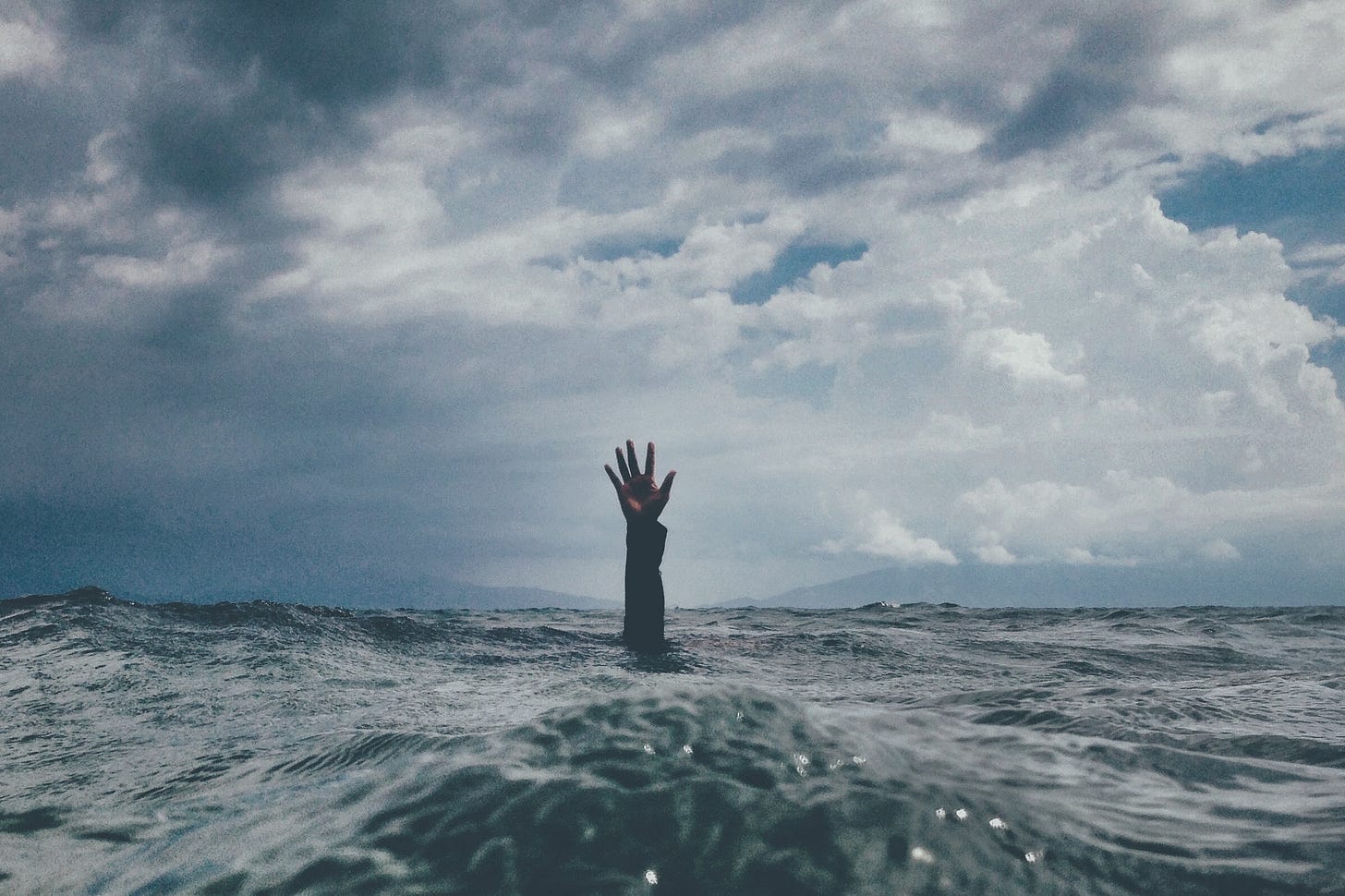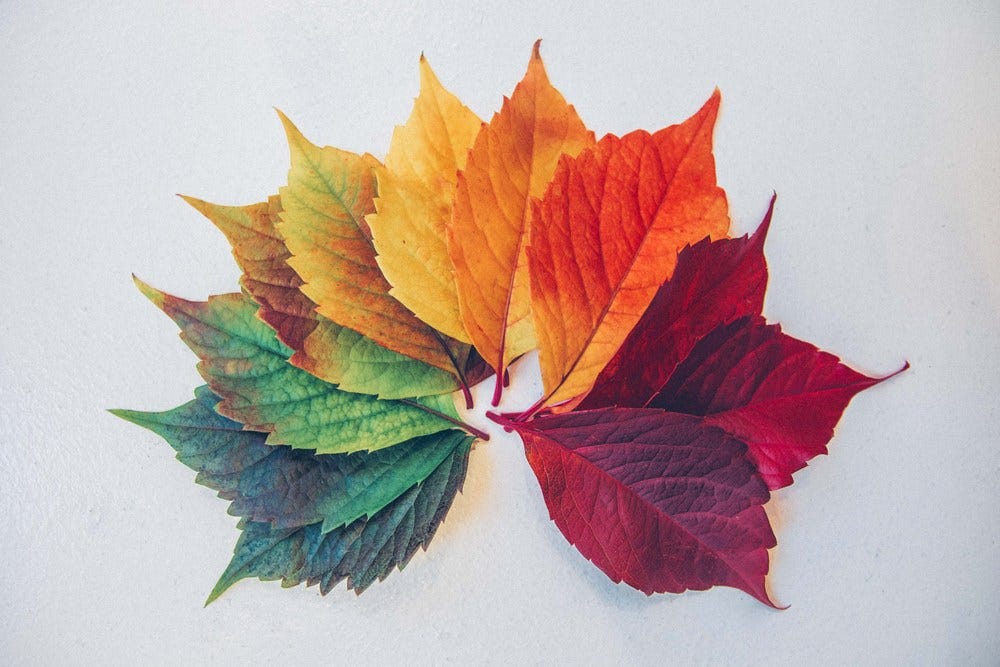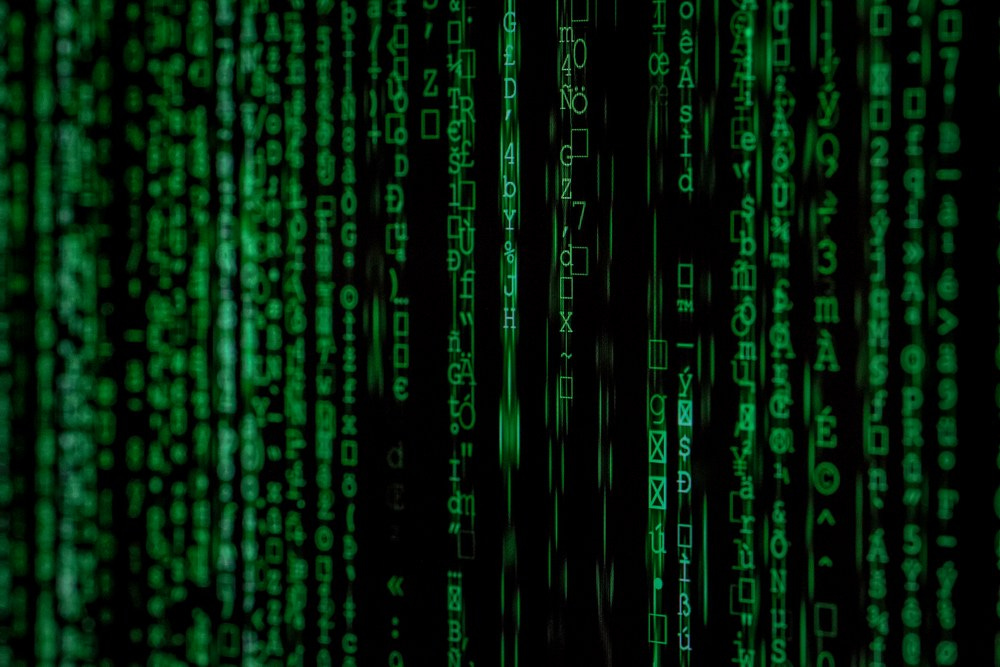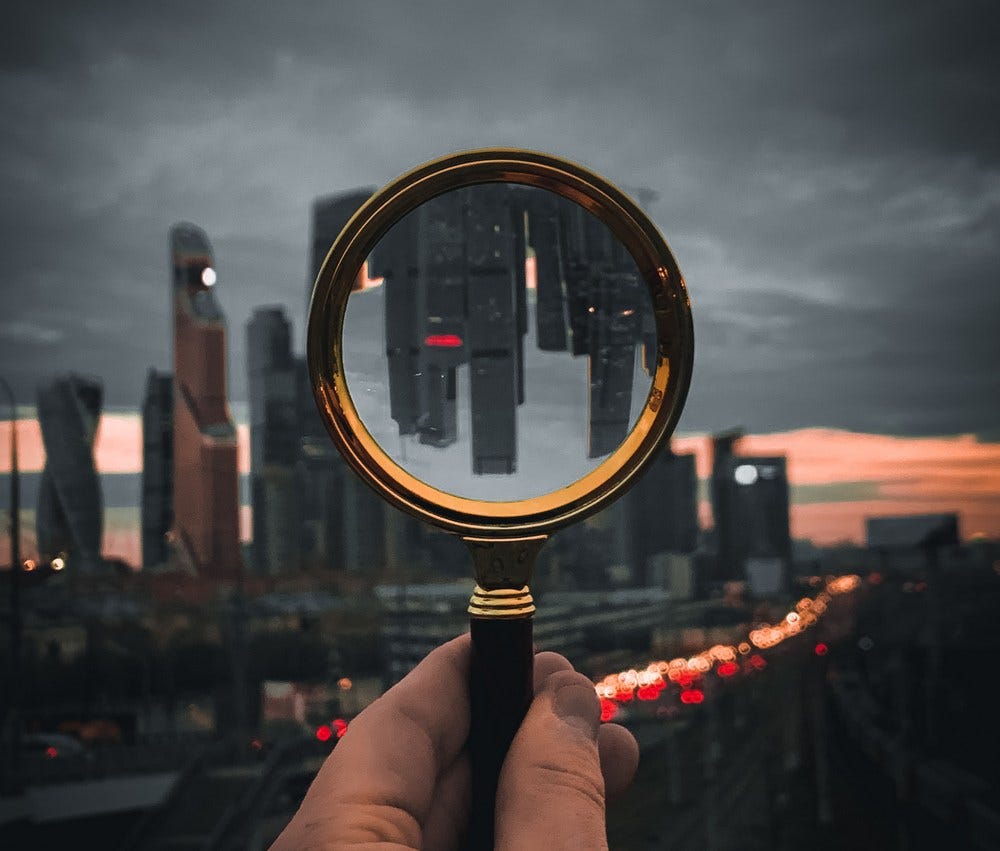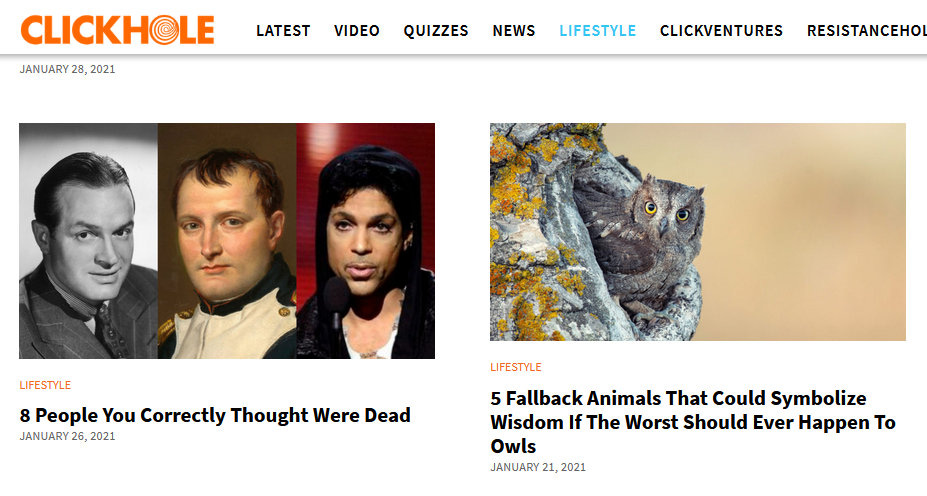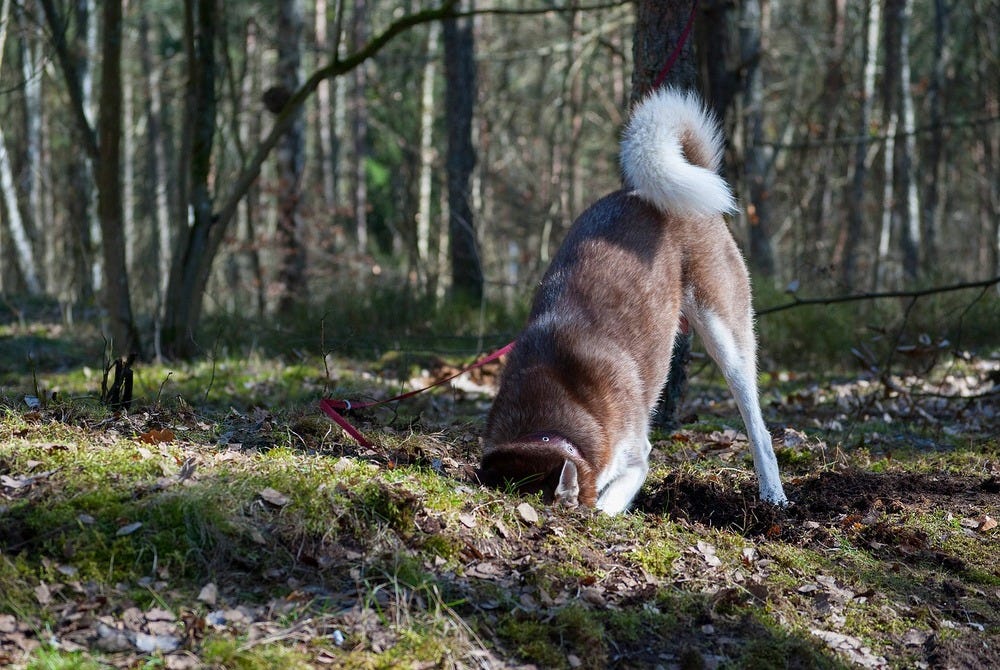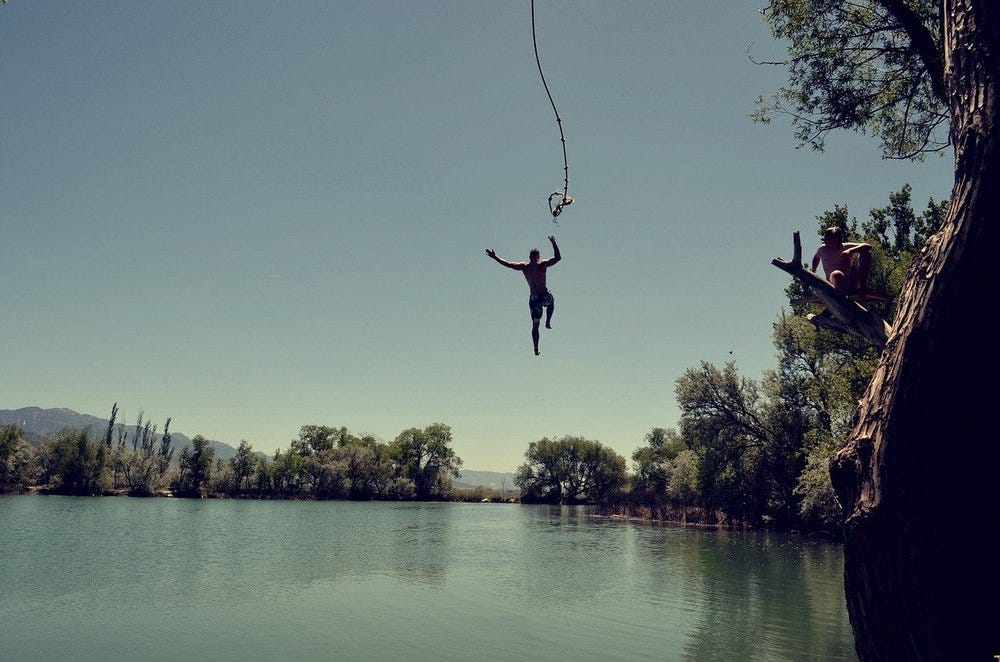One Curious Trick For Stumbling Over Your Fun
...and avoiding predatory clickbait hogwash.
Hi! This is a little more of Everything Is Amazing, a science-obsessed newsletter about curiosity, attention and wonder.
I’m guessing that you’re finding this month…let us say a touch stressful, considering what’s happening on November 5th across the Atlantic from where I am right now. A nail-biting time had by all.
I don’t write about politics. But I will say that taking meaningful breaks here and there, to allow yourself to enjoy something that is not about All That Stuff Right Now, is most definitely not treachery, and it’s not betraying your beliefs: it’s a vital part of how you maintain enough energy to keep showing up all the way to the finish line.
To paraphrase someone who understands how to keep going - if this is an ultramarathon of the soul, fill your boots with whatever snacks you need.)
However: if your brain is severely overheated with all this stuff and you find yourself online to such an extent that you’re tempted to hurl your phone in the sea and retreat into a cave - this newsletter (a rerun of a previous edition) is for you.
It’s about the story of someone who yelled OKAY THAT’S IT, I’M DONE WITH THE WEB - and the surprising facts of what happened next.
It’s 2012, and journalist Paul Miller is feeling swamped.
"Since 2005 I have had a job that required me to be on the Internet for at least 12 hours a day. And whatever I would do after work would be on the Internet too…
But I found it very distracting and I wanted to spend time studying and writing uninterrupted. I wanted to read books that I could have read at any time, but instead I was reading Reddit. I wanted to write things I wanted to write for a long time, but instead I was tweeting."
So Miller decides to get offline - for 12 whole months.
His employers at online magazine The Verge agree to let him write about his new, wholly offline life, which gives him enough money to live on. He sets up an iPad locked in Airplane mode, and once he’s finished writing each article, he physically hands the machine over to a colleague for uploading to the Web.
There are new challenges, for sure. Miller can’t research anything online, so finding a single statistic turns from a 10-second keyword search into a physical journey to a local library and a half-hour trawl through its archives. Suddenly, so much information is further away in time and space, harder to access, and rarely instantly available on demand. (He always has to plan ahead.)
But on the whole, his new lifestyle seems to suit him:
"I am so much more productive; I do in two or three hours what I would typically do in a full workday. I write more and in longer stretches and my mind is less cluttered. There is less to distract me while I am writing. There is no Internet to jump in and out of."
And his employers are delighted:
"I don't know that we could run an Internet-based business without a staff on the Internet, but because of Paul's experiment and generally much happier he seems without the Internet in his life, a lot of our staff members have taken vacations without the Internet," said Nilay Patel, the managing editor of The Verge.
"They go offline for the week or weekend and they come back very refreshed and rejuvenated and they come back with more complete thoughts.”
- “No Internet For One Year: Tech Writer Tries Life Offline,” Joanna Stern, ABC News
So that’s it then? The internet is the root of all evil - a mindless, soul-crushing, rage-inducing distraction that is ruining our mental and physical health? And therefore the secret to our wellbeing is to unplug from the Matrix and take a radical digital detox (brilliantly nicknamed “Waldenponding” by writer Venkat Rao)?
Not so fast.
One year later, Miller sums up:
“I was wrong.
One year ago I left the internet. I thought it was making me unproductive. I thought it lacked meaning. I thought it was "corrupting my soul."
It's a been a year now since I "surfed the web" or "checked my email" or "liked" anything with a figurative rather than literal thumbs up. I've managed to stay disconnected, just like I planned. I'm internet free.
And now I'm supposed to tell you how it solved all my problems. I'm supposed to be enlightened. I'm supposed to be more "real," now. More perfect.
But instead it's 8PM and I just woke up. I slept all day, woke with eight voicemails on my phone from friends and coworkers. I went to my coffee shop to consume dinner, the Knicks game, my two newspapers, and a copy of The New Yorker. And now I'm watching Toy Story while I glance occasionally at the blinking cursor in this text document, willing it to write itself, willing it to generate the epiphanies my life has failed to produce.
I didn't want to meet this Paul at the tail end of my yearlong journey.”
- “I’m still here: back online after a year without the internet,” Paul Miller, The Verge
What he found outside of the internet was a lot of emptiness and silence. Both were welcome at first. Being able to hear himself think and take his time over everyday activities? Delightful.
But then novelty wore off - and his problems began.
By removing the Web, he broke all the human connections that had made him feel part of overlapping networks of folk he wanted to be around. He discovered, for the first time, how the “virtual” isn’t something that can easily be unpicked from the “real,” since in today’s world, each depends upon the other in ways we rarely think about…
And he discovered this:
“By late 2012, I'd learned how to make a new style of wrong choices off the internet. I abandoned my positive offline habits, and discovered new offline vices. Instead of taking boredom and lack of stimulation and turning them into learning and creativity, I turned toward passive consumption and social retreat.
A year in, I don't ride my bike so much. My frisbee gathers dust. Most weeks I don't go out with people even once. My favorite place is the couch. I prop my feet up on the coffee table, play a video game, and listen to an audiobook. I pick a mindless game, like Borderlands 2 or Skate 3, and absently thumb the sticks through the game-world while my mind rests on the audiobook, or maybe just on nothing.”
Waldenponding was a bust. The internet was part of the problem, yes, but quitting it didn’t seem to be that golden ticket to a richer, less distracted life that Miller thought it would be.
So what will work?
“Curiosity” is one of those concepts where everyone sort of understands what it is, but there’s enough general vagueness around it to render it useless in a practical sense - so let’s try to get a little more specific here.
It’s a curiosity in itself that despite being the focus of thousands of years of human enquiry, the science of curiosity is largely in its infancy. Partly this reflects how little we still know about the working human brain, the hardware running our curiosity-software. And partly it’s because it crosses so many disciplines: a few generous scoops of neuroscience, a bit of psychology here, a little philosophy there…
But, very broadly speaking, we can point towards two major types of curiosity at work in our daily lives.
The first is called diversive. It’s the thrill of the shiny and novel - the kind of thing you experience every day when travelling somewhere new, as Anna Brones said here.
It’s also why you can’t stop clicking those infuriating headlines like “You’ll Never Guess What Happens Next” and “These Three Things Will Shock You”.
Clickbait like this (often displayed in chumboxes of attention-grabbing garbage) is weaponised diversive curiosity - the attraction of novelty, combined with a largely false promise of something you really want to know the answer to. And the end result? It feels like your fault. You hate yourself for clicking it (even though you were actually tricked into doing it). It’s a really toxic cycle of triggering and shaming.
The only good clickbait on the internet is at Clickhole, a parody site:
Diversive curiosity is why you can’t stop scrolling. Or signing up to anything described as “the next big thing.” Or doing pretty much anything where you’re not really enjoying yourself, only sort of digging in a half-comatose kind of way, but you guess it’s better than doing nothing?
Novelty for novelty’s sake is deeply distracting - and incredibly shallow. It’s training for a lifetime automatically skimming the surface of things without going deeper (making you perfect prey for internet advertisers). It teaches your brain to sip the world instead of drinking deeply from it. It fritters away a few spare minutes here and there, again and again, until you’ve lost hours, days, weeks, even years to…
Who knows? You can’t remember. Nothing stuck.
To balance this out, there’s the other type of curiosity.
When you latch onto something specific and get healthily obsessed with it (aka. ‘nerding out’), that’s your epistemic curiosity kicking in.
This sometimes gets called “academic curiosity,” because that’s how you’re trained in higher education. You get more and more specialised about what you know.
But the best illustration of the power of epistemic curiosity is to watch something like this:
A musician is someone who returns to the same piece of wood, metal and cured animal intestines (or whatever the modern equivalent is), again and again and again, until they are amazingly good at coaxing enjoyable noises out of it.
To get as good as my friends The Urban Folk Quartet (above) is the super-focused work of decades. And it requires huge amounts of epistemic curiosity. What more could I learn about this one thing? How much more is there to know? What can I learn about it that nobody else has learned before? How deep does this thing go?
Going full-on epistemic is like falling in love. Continually. Endlessly.
But choosing a thing to focus epistemic curiosity on is really, really hard.
Take that message the aspirational internet has been flinging at you for years: “FIND YOUR PASSION!”
Ah. What a nice thing it would be to know that you’ve found a vocation or hobby, or a small bunch of them, that you can single-mindedly devote huge chunks of the rest of your life to. How comforting!
Except, at the very same time, that same internet is firehosing us with triggers for our diversive curiosity that make us unable to choose. What if I pick the wrong thing? If I do this thing for the next week, I’ll miss distractedly half-assing 50 other things! What do I do? HALP.
It’s a psychological tug of war that leaves you trapped in the middle, frustrated and miserable - and, as with clickbait, you usually blame yourself for it.
It’s a really horrible feeling. And it stops us becoming healthily obsessed with really interesting things that would improve our mood no end.
And I think I have a solution.
Well, it’s not really my solution. I’m just channelling an amalgam of advice from people way smarter than me. (Start with Cal Newport, for example. Move on to Jenny Odell. Then read this by Nir Eyal. Then check out Ian Leslie’s book. And so on.)
But I’m going to be cheeky, and invent a law named after myself.
Sowden’s First Law Of Curiosity:
“You just have to try lots of different stuff for no damn reason.”
Yeah, I don’t think it’ll catch on either. Oh well.
But the point here is this:
If “finding your passion(s)” is so hard to do when your rational, logical brain gets involved (because it’s so easily and completely hijacked by that tug-of -war of logical motivations and subliminal emotional manipulation)…
Then why not leave the whole thing to chance?
Or more specifically: why not just throw yourself for a short period of time into a whole bunch of random things, one after the other?
The “for no damn reason” part of that Law is really important here.
One of the jobs of curiosity is to make you aware of things you didn’t previously know. Unfortunately, because we think we should be guided by “sensible” reasons to do things (conveniently forgetting how emotion-driven almost all our decisions are), we’re always deciding on our next actions based on what we currently know - not what we don’t yet know, or what we don’t know we don’t know.
(Yes, this is head-spinning stuff.)
In contrast, the gifts of applied curiosity are usually only seen clearly with hindsight. “When I first started looking at this thing, I never would have dreamed it would lead me here.”
But with training, you get a feel for the good stuff. Just an inkling.
This is the ‘gut feeling’ that journalists develop over time, and have such difficulty explaining to someone else. They know there might be a story in the thing they’re becoming curious about - but they don’t yet know the shape of it. So they say to their editors (or to themselves) “give me a week to find the story here,” with the unspoken understanding that it might go absolutely nowhere.
All this means that making “sensible” and “rational” strategic decisions in advance is actually of very little help here - because they’re all based on the ignorance that comes before discovery leads to enlightenment.
To learn something absolutely and utterly new to you, you need to add a little chaos to the proceedings. Something random and unpredictable.
Maybe even something stupid.
Like, say, a series of random-looking weekly challenges that send you in unexpected directions!
That’s my aim for you here.
So if I’d met Paul Miller in a coffee shop back then, and if I’d known back then what I know now, I’d say this to him:
“Firstly, skip Borderlands 2, mate. Try The Long Dark instead, it’s terrifying and stressful and you’ll have a brilliant time.
Secondly - you have a year offline, right? A whole year? And you have enough work lined up so money isn’t much of an issue, if you budget accordingly? Well then.
How about trying out 52 different things you’ve never done before?
Mix it up a bit, though. Do a bunch of stuff you’ve always wanted to do but never had the time, but also, get your friends to recommend some entirely new things as well. A nice balance of what you know will be fun, and what you don’t know will be fun.
But look: only do each thing for a week at a time. If something proves really amazingly great, make a note and return to it later. Keep going with the different things for now. The relentless variety will keep you from sliding into boredom and bad habits, the sheer pace of it will plug the gap that the removal of the internet has left in your life - and asking for suggestions from friends will help you keep connected with them. That’s what I’d do, sir. How about it?”
Then he’d give me a thumbs-up, quickly finish his drink and head out the door - and I’d never see him again, because he’d choose a different coffee shop in future. Yeah, nice place, good coffee. Too many weirdos.
But I hope I’d have made him curious enough to just give it a go.
He’d never guess what happens next.
If that gave you a few ideas for managing your brain over the next 2 weeks, I have another piece behind the paywall that uses lessons from modern behavioural psychology to keep you creatively moving forward across “the chasm of Ughhhh”.)
If you want to read it, right now is the perfect time: all paid subscriptions to Everything Is Amazing are 10% off until the middle of November:
You’ll get access to paywalled articles, free entry to my upcoming non-fiction storytelling course launching in November , and you’ll get a personal ‘curiosity call’ to motivate you to chase your own nerdiness in a similar way, as I explained here.
You’ll also be directly helping this newsletter exist. It’s completely dependent on reader support - and since EiA recently became my fulltime job, so am I. In the most real of senses, you’re helping keep the lights on - but you’re also helping me grow this project, hunt a few stories in person and get even weirder. That’s what you’d be investing in.
Click below to sign up with a 10% discount. Thank you so much (and welcome aboard)!
Images: Chris Lawton; SabbraCadabra; ROBIN WORRALL; nikko macaspac; Markus Spiske; Ruslan Gibadullin; Danielle MacInnes; Free-Images.


